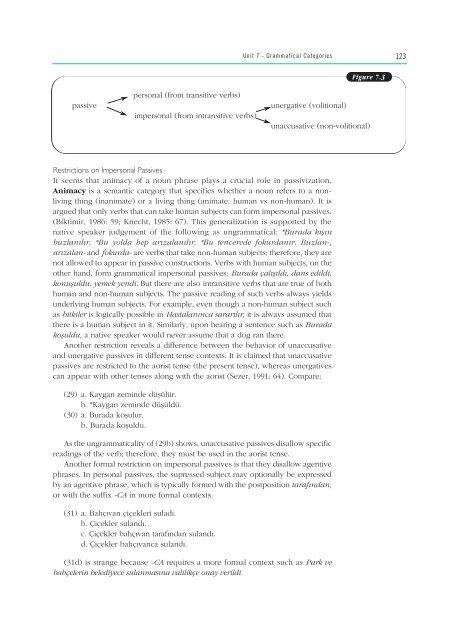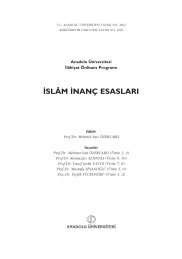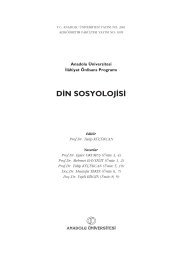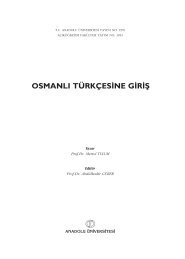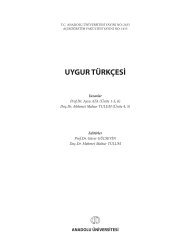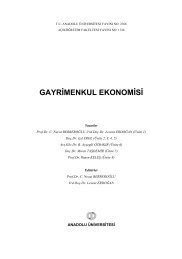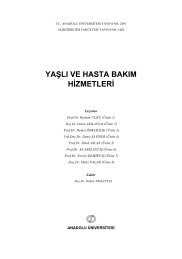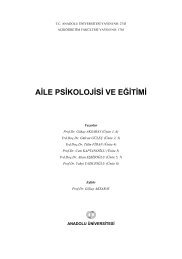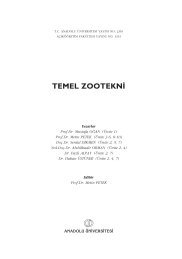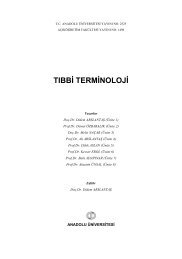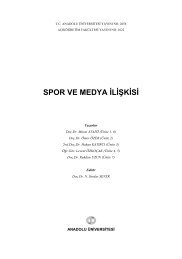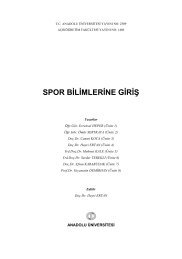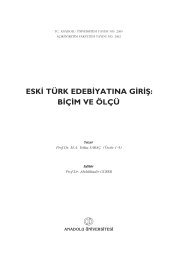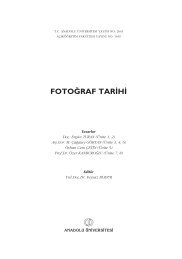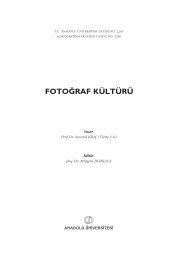turkish phonology and morphology (türkçe ses ve b‹ç‹mb‹lg‹s‹)
turkish phonology and morphology (türkçe ses ve b‹ç‹mb‹lg‹s‹)
turkish phonology and morphology (türkçe ses ve b‹ç‹mb‹lg‹s‹)
Create successful ePaper yourself
Turn your PDF publications into a flip-book with our unique Google optimized e-Paper software.
Restrictions on Impersonal Passi<strong>ve</strong>s<br />
It seems that animacy of a noun phrase plays a crucial role in passivization.<br />
Animacy is a semantic category that specifies whether a noun refers to a nonliving<br />
thing (inanimate) or a living thing (animate: human vs non-human). It is<br />
argued that only <strong>ve</strong>rbs that can take human subjects can form impersonal passi<strong>ve</strong>s.<br />
(Biktimir, 1986: 59; Knecht, 1985: 67). This generalization is supported by the<br />
nati<strong>ve</strong> speaker judgement of the following as ungrammatical: *Burada k›fl›n<br />
buzlan›l›r, *Bu yolda hep ar›zalan›l›r, *Bu tencerede fokurdan›r. Buzlan-,<br />
ar›zalan- <strong>and</strong> fokurda- are <strong>ve</strong>rbs that take non-human subjects; therefore, they are<br />
not allowed to appear in passi<strong>ve</strong> constructions. Verbs with human subjects, on the<br />
other h<strong>and</strong>, form grammatical impersonal passi<strong>ve</strong>s: Burada çal›fl›ld›, dans edildi,<br />
konufluldu, yemek yendi. But there are also intransiti<strong>ve</strong> <strong>ve</strong>rbs that are true of both<br />
human <strong>and</strong> non-human subjects. The passi<strong>ve</strong> reading of such <strong>ve</strong>rbs always yields<br />
underlying human subjects. For example, e<strong>ve</strong>n though a non-human subject such<br />
as bitkiler is logically possible in Hastalan›nca sarar›l›r, it is always assumed that<br />
there is a human subject in it. Similarly, upon hearing a sentence such as Burada<br />
kofluldu, a nati<strong>ve</strong> speaker would ne<strong>ve</strong>r assume that a dog ran there.<br />
Another restriction re<strong>ve</strong>als a difference between the behavior of unaccusati<strong>ve</strong><br />
<strong>and</strong> unergati<strong>ve</strong> passi<strong>ve</strong>s in different tense contexts. It is claimed that unaccusati<strong>ve</strong><br />
passi<strong>ve</strong>s are restricted to the aorist tense (the present tense), whereas unergati<strong>ve</strong>s<br />
can appear with other ten<strong>ses</strong> along with the aorist (Sezer, 1991: 64). Compare:<br />
(29) a. Kaygan zeminde düflülür.<br />
b. *Kaygan zeminde düflüldü.<br />
(30) a. Burada koflulur.<br />
b. Burada kofluldu.<br />
As the ungrammaticality of (29b) shows, unaccusati<strong>ve</strong> passi<strong>ve</strong>s disallow specific<br />
readings of the <strong>ve</strong>rb; therefore, they must be used in the aorist tense.<br />
Another formal restriction on impersonal passi<strong>ve</strong>s is that they disallow agenti<strong>ve</strong><br />
phra<strong>ses</strong>. In personal passi<strong>ve</strong>s, the supressed subject may optionally be expressed<br />
by an agenti<strong>ve</strong> phrase, which is typically formed with the postposition taraf›ndan,<br />
or with the suffix -CA in more formal contexts.<br />
(31) a. Bahç›van çiçekleri sulad›.<br />
b. Çiçekler sul<strong>and</strong>›.<br />
c. Çiçekler bahç›van taraf›ndan sul<strong>and</strong>›.<br />
d. Çiçekler bahç›vanca sul<strong>and</strong>›.<br />
Unit 7 - Grammatical Categories<br />
(31d) is strange because -CA requires a more formal context such as Park <strong>ve</strong><br />
bahçelerin belediyece sulanmas›na valilikçe onay <strong>ve</strong>rildi.<br />
Figure 7.3<br />
personal (from transiti<strong>ve</strong> <strong>ve</strong>rbs)<br />
passi<strong>ve</strong> unergati<strong>ve</strong> (volitional)<br />
impersonal (from intransiti<strong>ve</strong> <strong>ve</strong>rbs)<br />
unaccusati<strong>ve</strong> (non-volitional)<br />
123


